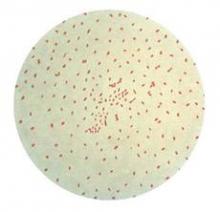The current pertussis epidemic in Washington state and increased rates nationwide underline the critical importance of vaccinating pregnant women and other adults who are in contact with babies against pertussis, Dr. Anne Schuchat said during a Centers for Disease Control and Prevention telebriefing.
Reports of pertussis have been increasing in infants, as well as among children aged 10, 13, and 14 years in Washington and nationwide, making the recommended booster for children with the Tdap vaccine essential, said Dr. Schuchat, director of the National Center for Immunization and Respiratory Diseases at the CDC in Atlanta.
Pertussis vaccination "remains the single most effective approach to preventing infection," she said, noting that unvaccinated children are at an eightfold greater risk of getting pertussis than those who have been fully vaccinated with DTaP. And vaccinated children who do contract pertussis typically have milder cases.
In 2010, only 8% of adults had any history of having received a Tdap booster, she said.
In addition to encouraging patients to get the vaccine, clinicians also are being urged to consider pertussis as a possible diagnosis in their patients who have a persistent cough, she said.
Since the middle of 2011, cases of pertussis have been increasing in Washington state, and in April 2012, a pertussis epidemic was declared when 640 cases had been reported. As of June 16, 2,520 cases had been reported in 2012, a 1,300% increase from the same time period the year before, and the highest number of cases reported since the early 1940s (MMWR 2012;61:517-22).
To date, nine babies in the United States have died of whooping cough (one more than reported in the MMWR), Dr. Schuchat reported.
A higher-than-expected number of cases also have been reported in other states, with similar trends in the age groups affected, "and there may be many more coming," Dr. Schuchat said. In 2010, more than 27,000 cases were reported nationally, with 27 deaths (25 in infants).
Pertussis outbreaks occur in waves, with peaks every 3-5 years. During this current wave, the highest rates have been in infants under 1 year of age, with over half in babies under 3 months. These children are too young to be protected with the vaccine that is first administered at age 2 months, so they are dependent on the immunity of people around them, which is why pregnant women and adults who are around babies are being urged to get vaccinated, she said.
The rates of pertussis have started to increase after late childhood, with a higher rate in 10-year-olds, but then the rate decreases in 11- to 12-year-olds, and then increases among 13-year-olds, Dr. Schuchat said. These trends also point to the importance of the recommended Tdap vaccine in those aged 11 and 12 years .
The increase in pertussis cases reported in adolescents aged 13-14 in Washington state and nationally is a concern, and possible causes are being studied further. A contributing factor could be the switch from the whole cell to the acellular vaccine, which may have an effect on how long immunity persists. "Waning of protection over time may be part of the story," she said, pointing out that unvaccinated people are not thought to be driving this current wave of infection.
Dr. Schuchat said that the increase in pertussis cases goes beyond Washington State. "We really think the disease is spreading around the country. ...We’re in for a tough year and a tough couple of years."


